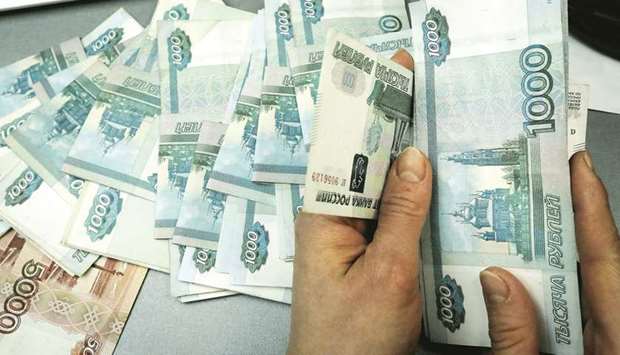Russia’s rouble shrugged off a collapse in emerging-market assets yesterday after the latest round of US sanctions proved less severe than investors feared.
“The draconian sanctions that many had in their negative scenarios weren’t realised,” said Valery Vaisberg, head of research at Region, a Moscow investment house. “The rouble will probably strengthen gradually.” While developing-nation assets tumbled yesterday as the US-China trade war escalated, the rouble climbed for the first time in seven sessions and bonds were flat.
Russian markets slid on Friday after initial reports of the new restrictions, which for the first time extended to official debt. It was only after markets closed that the US released the details, showing the limits were narrower than feared – banning US banks from buying new issues of non-rouble Eurobonds but leaving the much-larger market for rouble securities, known as OFZs, unaffected.
The rouble traded 0.4% stronger against the greenback yesterday in Moscow and 10-year bond yields tumbled 11 basis points.
Still, the sudden surprise from the White House last week was a rough reminder for a market that had for most of this year put aside sanctions fears to cash in on some of the highest real rates in the world.
The equivalent of $13bn in foreign money flooded into the rouble bond market through the end of July and the rouble was the second-best performer among emerging-market currencies. Negative and falling returns in many developed markets only added to the enthusiasm.
For Russia, which is running a budget surplus and already placed all of its planned Eurobonds this year, the direct financial impact of the new limits is likely to be limited, analysts said. “Wide exemptions for local Russian debt and state-owned enterprises blunt the impact of the move,” analysts at Eurasia Group wrote on Saturday in a note. “But the odds have gone up that these categories could become subject to sanctions in the future.”
Together with the latest spike in trade tensions between the US and China, some investors see the new sanctions scare as a compelling reason to reduce risk. Yesterday, emerging-market currencies headed for their biggest drop in more than two years amid speculation China was allowing its currency to depreciate to counter President Donald Trump’s latest tariff threat.
“In my view, it’s time to close emerging-market longs including the rouble,” said Nader Naeimi, AMP Capital’s head of dynamic markets in Sydney. “I closed rouble exposure in my fund on Friday together with all other” bullish wagers on emerging-markets currencies, he said. Disturbing thing about sanctions is that currently OFAC just has to modify its definition of “sovereign debt” in 2d round of Skripal sanctions to impose sanctions on OFZ. Previously US Congress had to adopt one of sanctions bills for alleged election meddling for this to happen.
The latest sanctions had been in the works since late last year for what the US and its allies say was the Kremlin’s role in a deadly chemical weapons attack against a former spy in the UK in March 2018. Russia denies any role in the incident.
Apparently reluctant to worsen relations with the Kremlin, the White House had held off on imposing the new sanctions until pressure from Congress to act grew last week, leading to the sudden announcement.
“The move sharply lowers the chance that hawks in Congress will pass harsher sovereign debt sanctions, even if the most ardent among them do not find the measures sufficient,” the Eurasia Group analysts wrote.

Russia’s rouble shrugged off a collapse in emerging-market assets yesterday after the latest round of US sanctions proved less severe than investors feared
